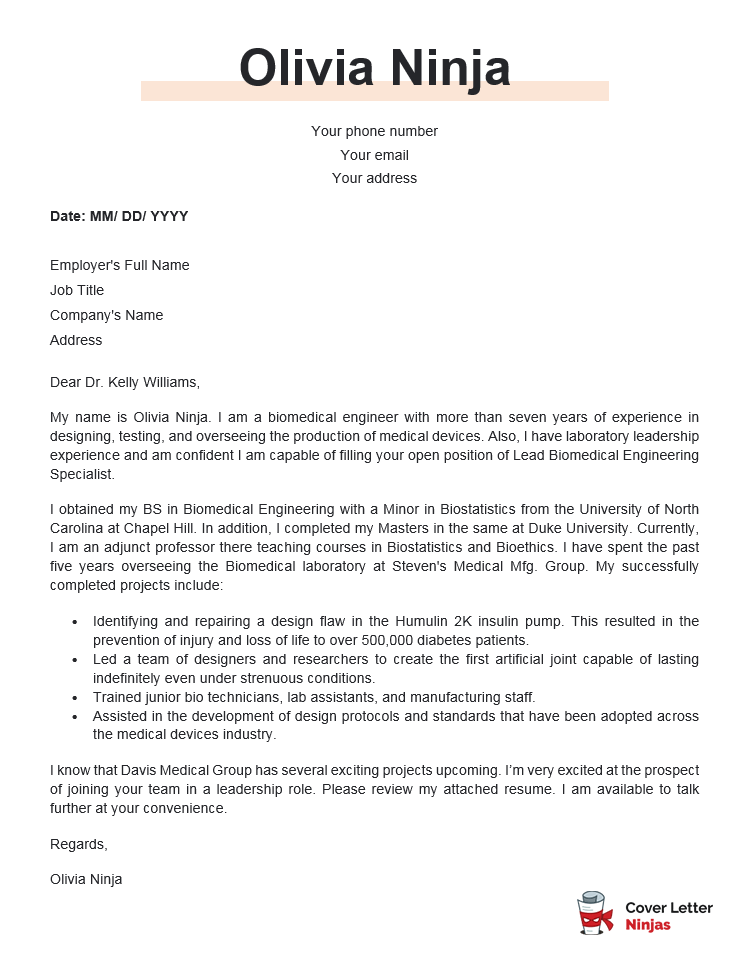
A resume is useful but ultimately limited. It provides a list of jobs, education, and skills to be double-checked by the hiring manager. On the other hand, your cover letter is your way of communicating about the kind of work that you are passionate about in the biotech industry.
Even better, it allows you to discuss why you would be the ideal fit for a particular job. By using the tips below, and our biotech cover letter sample, you should be able to pair a great cover letter with your resume.
Sell Your Research and Leadership Qualifications From The Start
‘I saw your job listing, and decided to apply.’ Sadly, this boring line is used to open cover letters all too often.
There’s nothing about this that tells the reader you are qualified for the position, or that you would bring something valuable to the table. Instead, open with a statement that mentions the one qualification you have that will appeal to the hiring manager. Maybe something like this:
‘My name is Everett Woods, and I am a dedicated scientist with more than five years of clinical research experience. I am confident that I can lead the biomedical research lab at Stanley Medical products.’
In just two sentences you’ve given your years of experience, and area of expertise. Even better, you’ve matched your qualifications with the needs of the employer.
Focus on Concrete Results
Biotech involves applied science. The purpose of the work you do is to add practical value and to create a result that is beneficial to the company. This could be expressed in money saved, spending reduced, measurable improvement in efficiency, increased revenue, etc.
When you write about your key duties, focus on the results you were able to achieve. For example, don’t say that you conducted laboratory tests on artificial heart valves. Instead, write that your testing led to the discovery and repair of a design flaw that helped the company save over half a million dollars.
Make Academic Achievements Relevant
If you don’t have much depth of experience, it’s perfectly fine to use your academic history. The key here is to make that work as relevant as possible. So, imagine that you participated in a year-long research project relating to nanotechnology. Rather than mentioning that you were able to publish an article in a major scientific journal, focus on the practical applications of the work you did.
For example, if you were a research assistant on the project explain what research methods did you use that you could also use in a commercial lab. What tools did you use while doing your research? Did the work you did attract the attention of anybody in the local business community?

Claire Webber
Career Consultant, CPCC, CPRW
Use a Conversational Tone
All the technical information in your cover letter could make you sound a bit robotic. You’ll want to balance this out a bit. Keep things friendly and conversational without being too casual. The idea is to show that you are approachable and that you can communicate well with a variety of people, including colleagues that may not be technically savvy. You can check other cover letters on our website to get a better grasp of the different tones.
Also, take a look at the company website. Read their online content. Check out the news and press release section of their site if you can find it. This will give you a clearer picture of the general tone of communication that is part of their company culture. Then try to mimic it in your letter.
Biotech Cover Letter Sample in .docx Format

Download example (Word version)
Biotech Cover Letter Example – Text Format
Now, take a close look at our sample cover letter. Feel free to bookmark it to use as a guide.
Dear Dr. Kelly Williams,
My name is Olivia Ninja. I am a biomedical engineer with more than seven years of experience in designing, testing, and overseeing the production of medical devices. Also, I have laboratory leadership experience and am confident I am capable of filling your open position of Lead Biomedical Engineering Specialist.
I obtained my BS in Biomedical Engineering with a Minor in Biostatistics from the University of North Carolina at Chapel Hill. In addition, I completed my Masters in the same at Duke University. Currently, I am an adjunct professor there teaching courses in Biostatistics and Bioethics. I have spent the past five years overseeing the Biomedical laboratory at Steven’s Medical Mfg. Group. My successfully completed projects include:
- Identifying and repairing a design flaw in the Humulin 2K insulin pump. This resulted in the prevention of injury and loss of life to over 500,000 diabetes patients.
- Led a team of designers and researchers to create the first artificial joint capable of lasting indefinitely even under strenuous conditions.
- Trained junior bio technicians, lab assistants, and manufacturing staff.
- Assisted in the development of design protocols and standards that have been adopted across the medical devices industry.
I know that Davis Medical Group has several exciting projects upcoming. I’m very excited at the prospect of joining your team in a leadership role. Please review my attached resume. I am available to talk further at your convenience.
Regards,
Olivia Ninja
Final Tip: Mention Your Education Carefully
As a general rule, you should leave information about your education in your resume. Yes, in the example above we did break that rule. However, in this case, we had a good reason. Because Chapel Hill and Duke are such prestigious schools, they are worthwhile ‘attention getters’. On the other hand, if our sample applicant had just attended a run-of-the-mill state university, we would have left that information out entirely. As a rule of thumb, it’s best to highlight your latest educational experience only, be it a postdoctoral position or certification program.
